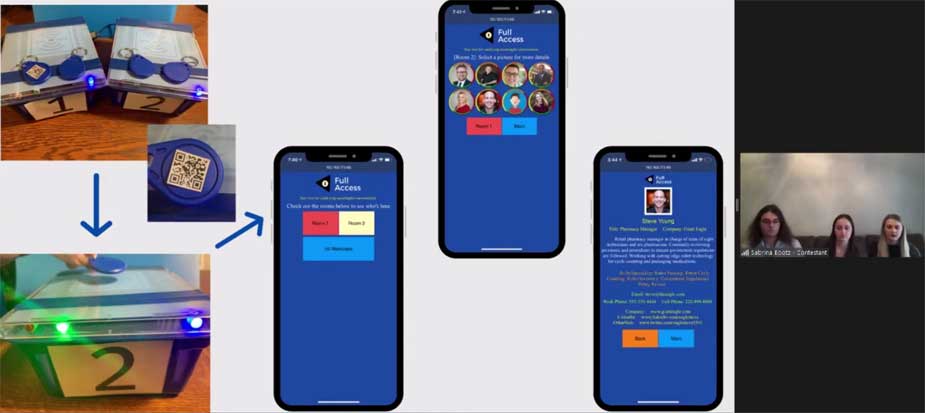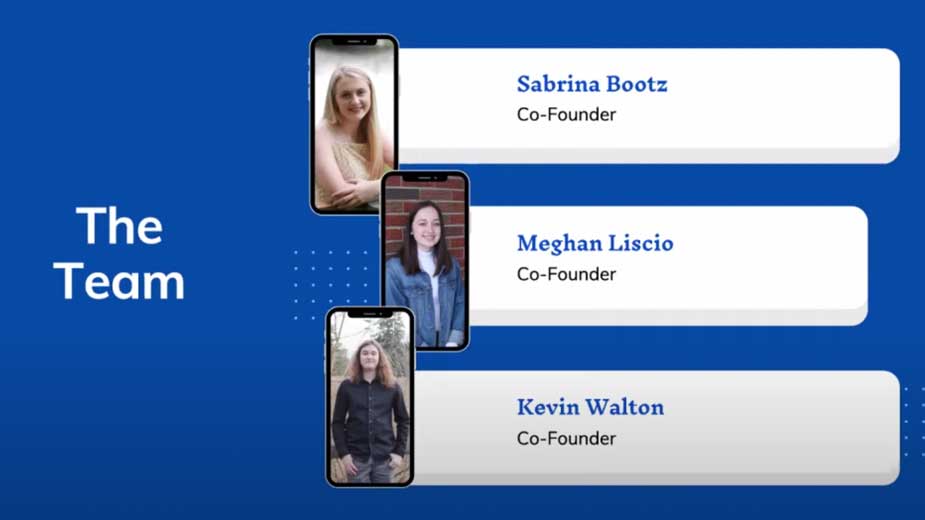SHARON, Pa. — Sabrina Bootz, Meghan Liscio and Kevin Walton gave their best virtual pitch Wednesday night for the third annual What’s Your Big Idea? Challenge.
Penn State Shenango’s VenturePointe Incubator, the eCenter@LindenPointe and Penn-Northwest Development Corp. presented this event, which was held virtually via the campus’ YouTube page. This partnership strives to give local entrepreneurs and innovators the opportunity to further their progress.
The three inventors scored highest among the three judges, winning $1,000 in prize money, the opportunity to attend a four-week idea test lab through Invent Penn State and receive business support from Penn-Northwest Development Corp.
This year’s challenge was open to any Pennsylvania resident or student.
Bootz, Liscio and Walton devised Full Access — a wearable radio-frequency identification fob that can be used as a social website in the palm of the user’s hand. The fob scans business cards at social gatherings, allowing the user to quickly ascertain if they would like to network with that person.

This product would be used at convention centers and event venues, with the potential to expand to weddings, nonprofits or even the workplace.
Normally at such events, a name tag is used to identify someone, Walton says. But it might be flipped the wrong way or hidden by one’s suit jacket.
“This is amplified when you’re standing in a sea of unfamiliar people,” he says. “Because of this you find yourself hugging the wall, embarrassed, frustrated as you observe others who have cracked the code of networking, wishing you had done the same.”
With Full Access, attendees are supplied with an RFID fob scanned on a card reader whenever they enter a new room, Liscio said. After the scan, attendees have access to the attendees at the conference, including name, company they work for, contact information and a picture similar to LinkedIn, she said.
In past years, What’s Your Big Idea has drawn 25 to 30 applicants, who are paired down to a top five, says Georgia Macris, coordinator of Penn State Shenango VenturePointe Suite. This year, due to a technicality, it was reduced to four.
Macris says the incubator is a signature program of the Invent Penn State Commonwealth-wide initiative to spur economic development. There are 21 launch boxes and innovation hubs embedded within the commonwealth campus communities providing no-cost resources.
Second-place winners Nikoli DoBosh and Ryder Rust devised an aloe-based product called Magia Verde to solve discomfort from clothes when the skin is sunburnt.

Rust says his product takes fabric and infuses it with aloe to make aloe strips. Then, magnets are added to act as clips on hats, swimsuits, clothing straps and sandals.
Magia Verde gives immediate relief through the aloe and protects with the calendula flowers infused in the strips, DoBosh adds.
The other two presentations were by Lauren Kuncio and Marissa Nichter.
Kuncio’s product, IllumiLit, illuminates the ink on book pages, allowing readers to read paperback books in bed or in the car and night and not disturb the people around them.
Note-To-Go, Nichter’s product, is an online agenda where all class assignments, tests and due dates are stored in an interactive application.
The three runners-up each received $125 and the opportunity to attend an Invent Penn State idea test lab.
Each entrepreneurial team gave a five-minute presentation, followed by a five-minute question and answer session from the three judges. The virtual audience, which was on the Zoom call broadcast on YouTube, had a chance to ask questions as well. Presentations explained how each product solved a define problem, how they worked and how they will do in the market, as well as potential for growth and revenue streams.
This year’s judges were Macris, eCentre@LindenPointe Executive Director Jeff Meier and Gary Dovey, Penn-Northwest’s vice president of business development.
“This is where the entrepreneur can ideate and test their idea by working with their target audience and making iteration to their idea as needed,” Macris said.
The Full Access team displayed a 16.25% profit margin and charged $40.18 for each fob, reader and programmer. The product includes different options to purchase, the team added. The trio of inventors had help from an event coordinator, a cybersecurity college student and a computer programmer.
Meier asked if the Full Access group looked at the security measures of the product.
Walton responded that Full Access uses a private server programmed prior to the event. “When you leave, all the information would be discarded,” he said.
Another feature of the product is it doesn’t just show who was invited to the event, but it shows who is in the individual rooms at that moment or an overview of the attendees in real time, Bootz added.
“You don’t have to waste time looking for someone who might not be there,” she said.
